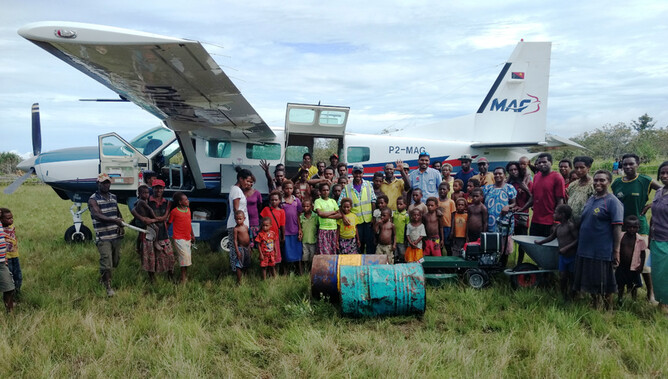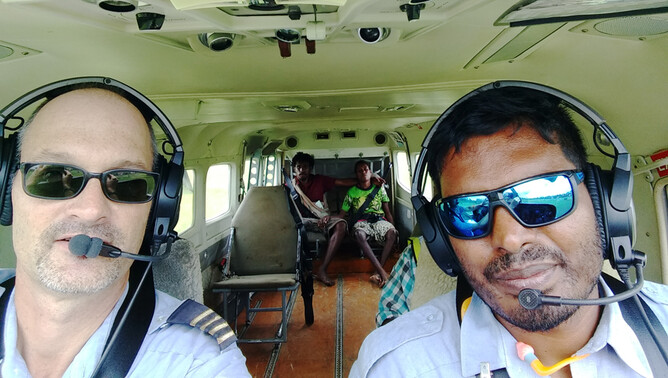Stewardship is one of our key values. For staff on the ground, this boils down to "efficiency" and since the start of this year, we have been on a drive to maximise our flying days. More flights mean that more people can be served and more impact on an individual and community basis. At the same time, we try to ballance efficiency with Care.
One Monday recently, the Mt Hagen based Cessna Caravan P2-MAG was dedicated for our partner organisation, the Rural Airstrips Agency (RAA), which does a wonderful and important job maintaining remote airstrips across PNG. The planning for a flight to ferry fuel drums to Kawito had been done weeks in advance. RAA had been assured that the fuel would be delivered on time.
One stop on the way took extra time. The airstrip at a place called Dewara looked good and safe for landing. We made a smooth touch down and decelerated to a stop. But as we tried turning the aircraft to taxi towards the parking bay, we realised that we were stuck in the ground. Having been in similar situations before, we quickly shut down the aircraft and unloaded the cargo. Our left wheel was an inch into the soft ground and some quick shovel work helped us get out of the soft ground—with some delay woven into our schedule. We made it up with quick turnarounds in the next two communities. We were looking forward to completing out next two deliveries and eventually head back to Mt Hagen, before the notorious highland weather starts posing problems.
On arriving in Kawito, we were welcomed with the news that the promised fuel drums had not yet arrived. Eventually, after one hour of waiting, the drums were loaded and we were heading to Wasua. The nature of the Wasua airstrip meant heavy penalties (limitations on landing and takeoff weights) so we were flying with minimum fuel onboard to reduce our weight.
There were showers in the vicinity, so we had a good look at the Wasua airstrip before proceededing to land. As we unloaded our cargo and were preparing for our departure, a community member informed us of a patient, a lady who had been suffering for weeks and who needed to be transported to the hospital at Balimo. We worked out the fuel and flight plan and the 'medevac' seemed feasible. We quickly made queries and realised that it would take twenty minutes to get her to the airstrip. With our minds still focussed on our return trip, we promised to wait for a maximum of thirty minutes and no more.
The time was ticking and we were growing uneasy. The concept of time in PNG can be very flexible. It was decision time—do we wait or leave? Finally, I could perceive some activity as noises emerged from the bush path behind the tall grass and trees. As I waited impatiently, all I could see was a small person perched on the shoulders of someone and a number of heads following in the distance. And then all of a sudden, the movement stopped, near a tree. I was growing restless as I waited—do they really have to take rest, now? Can't they hurry up? Don't they know we have a schedule? All these thoughts were bursting onto my mind—my mind so filled with me and my schedule.
Finally, to my relief, the procession started moving and I got a glimpse of a frail woman perched on the shoulders of a man. The man had beads of sweat streaming down his face. Maybe tears too, I don't know.
I watched as he finally put his wife on the floor of the airplane. A man who had been working in his garden, when someone scrambled screaming, the 'balus' (plane) has come and the pilots are willing to take your wife! A wife who had been lying helpless, maybe even hopeless. Wasting away, unable to walk to the hospital and knowing very well the final outcome of her sickness,
I imagined how the man would have suddenly heard the scream of 'balus'. The shout of hope! Dropping everything he was doing, he would have been off, walking with his wife on his shoulders. No thoughts, no plans, no packing, no preparations. Just moving, towards the 'balus', towards 'Hope'. Hope has wings. Indeed.
I saw the man finally catching his breath. Someone from the community thrust a few Kina (PNG currency) into his hands. Someone else handed him a plastic bag. As we managed to seat the passengers and run through the safety briefing, I couldn't take my eyes off him, clutching tightly onto his battered health card, not knowing what lay ahead.
We landed at Balimo and the man carried his wife to a makeshift shelter. I carried the small plastic bag, probably holding a sago cake or two and a pair of worn-out slippers so he could try to make her comfortable.
We were hoping an ambulance would but in the meantime we asked some local workers to help the couple. We had to go. We had a programme ahead. As I was leaving, the man walked up to me. With an expression of complete gratitude, he uttered 'Thank you'. A lot more was communicated than was said. My heart crumpled inwards. I turned back towards the 'balus'. Another life saved. Maybe. Hopefully.
As I stared at the vast expanse of blue ahead of me on our return trip, I was haunted by the fact that I had been so close to leaving the airstrip without the man and his ailing wife!
And the thought remains. Does my drive for efficiency overwhelm my ability to empathise? Am I 'mindful of others' or am I more concerned about my work, my schedule and my life? In my penchant for being effective and efficient, am I too busy to CARE?

